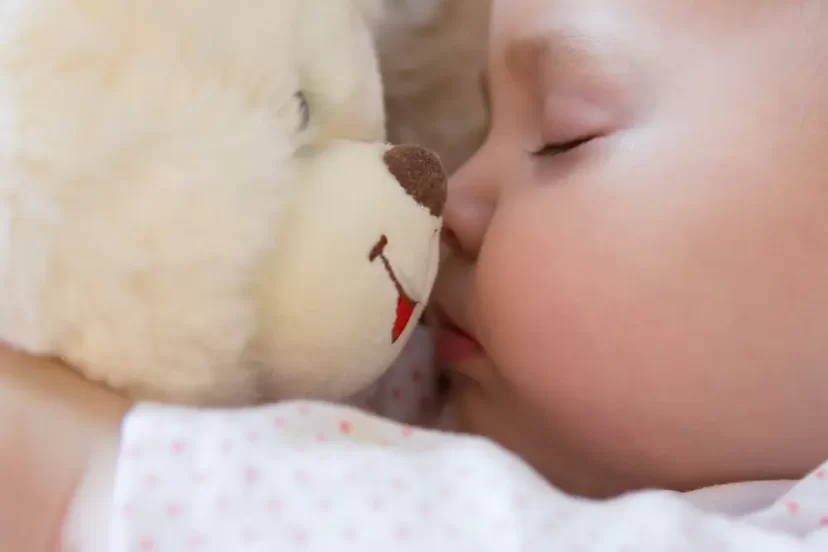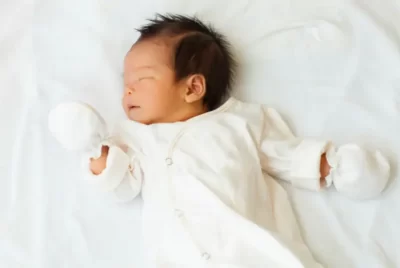Sleep Training Associations: Understand Their Impact on Baby’s Sleep
We may earn a small commission for purchases made using our links (not affecting your price).
See our disclosure to learn more.
A good night’s sleep is crucial for both babies and parents alike. One topic that often comes up in discussions about baby sleep is sleep training associations. When it comes to sleep, babies often develop associations with certain objects, actions, or conditions that help them fall asleep and stay asleep. These associations become part of their sleep routine and can significantly impact their ability to sleep well independently. In this article, I will explain what sleep associations are, and their importance, and provide helpful suggestions on creating healthy associations for your baby.
What are sleep training associations?
Sleep association refers to the specific cues or conditions that a baby associates with falling asleep. These associations can be both external, such as rocking or a pacifier, and internal, such as nursing or being held. Babies rely on these associations to feel secure and comfortable, making it easier for them to fall asleep.
Why are sleep associations important for babies?
Sleep association plays a vital role in helping babies transition from wakefulness to sleep. They provide a sense of security and comfort, allowing babies to feel relaxed and ready for sleep. When babies have healthy associations, they are more likely to fall asleep faster and stay asleep longer.
Common associations for babies
Understanding the common sleep association can help you identify the ones your baby relies on. Here are a few examples:
Swaddling
Swaddling involves wrapping your baby snugly in a blanket, mimicking the feeling of being in the womb. It can help calm and soothe babies, promoting better sleep.
Pacifiers
Pacifiers provide babies with a sucking motion that can be soothing and comforting. They can help babies relax and fall asleep.
White noise
White noise, such as the sound of a fan or a specially designed machine, can create a soothing environment that masks other noises and helps babies sleep soundly.
Rocking or motion
Many babies find the gentle rocking or motion of being held, in a swing or a rocking chair, incredibly soothing. This movement can help them drift off to sleep.
Benefits of sleep associations
Sleep association offers several benefits for both babies and parents:
1. Improved sleep: When babies have positive associations, they can fall asleep faster and sleep for longer periods, promoting healthier sleep patterns.
2. Comfort and security: Associations provide babies with a sense of comfort and security, reducing anxiety and promoting relaxation.
3. Self-soothing skills: Healthy associations can encourage babies to develop self-soothing skills, helping them learn to fall asleep independently.
Potential drawbacks of associations
While associations can be beneficial, it’s important to be aware of potential drawbacks:
1. Dependency: Babies may become overly dependent on certain associations, making it challenging
for them to fall asleep without them. This can lead to sleep disruptions when the association is not present, such as when a pacifier falls out or the rocking motion stops.
2. Sleep disruptions: If an association is not sustainable throughout the night, it can cause frequent awakenings as babies seek to recreate the association.
3. Transition difficulties: As babies grow older, it may become necessary to transition away from certain associations. This transition can be challenging and may temporarily disrupt sleep.
Creating healthy sleep association
While associations can be beneficial, it is important to establish healthy ones that promote independent sleep. Here are some suggestions:
1. Gradual transition: If you need to change or eliminate a sleep association, do so gradually. Gradual changes allow babies to adjust and feel more comfortable with the new routine.
2. Consistency and routine: Establish a consistent bedtime routine that incorporates positive associations. This routine signals to your baby that it is time to sleep and helps them feel secure.
3. Promoting self-soothing: Encourage your baby to develop self-soothing skills by providing them with opportunities to fall asleep independently. This can be done by gradually reducing the reliance on external associations.
4. Providing a safe sleep environment: Create a safe sleep environment for your baby. Use a firm mattress, remove any loose bedding or toys, and ensure the room is at a comfortable temperature.
Tips for reducing dependency on sleep associations
If you feel that your baby’s associations are becoming a hindrance, here are some tips to reduce dependency:
1. Introduce alternative soothing methods: Gradually introduce new soothing methods that can replace the current association. For example, if your baby relies on rocking, you can try gentle patting or singing instead.
2. Encourage self-settling: Help your baby learn to self-settle by putting them down drowsy but awake. This allows them to practice falling asleep without relying solely on external associations.
3. Provide comfort and reassurance: Offer comfort and reassurance during the transition period. Stay close to your baby, and use gentle touch or soothing words to let them know you are there for them.
4. Be patient and consistent: Changing associations takes time and consistency. Stick to the new routine and give your baby time to adjust.
Understanding when to make changes
It is important to assess when it may be appropriate to make changes to sleep association. Every baby is different, so consider the following factors:
1. Age: Babies develop at different rates, and their sleep needs change over time. Assess if your baby is developmentally ready for changes in associations.
2. Sleep patterns: If your baby’s sleep patterns are consistently disrupted or they are having difficulty self-soothing, it may be a sign that a change in associations is needed.
3. Parental readiness: Evaluate your own readiness for making changes. It can be emotionally challenging to transition away from associations, so ensure you are prepared for the process.
Seek professional guidance
If you are struggling with sleep associations or encountering difficulties in implementing changes, consider seeking professional guidance. Pediatric sleep consultants or healthcare providers can provide personalized advice and support tailored to your baby’s specific needs.
Conclusion
Understanding sleep associations is crucial for creating healthy sleep habits for your baby. While associations can provide comfort and promote better sleep, it is important to establish a balance between reliance and independence. Gradual transitions, consistency, and promoting self-soothing skills are key to creating positive associations. Remember to be patient and seek professional guidance when needed to ensure the best sleep outcomes for your baby.
FAQs
1: Can sleep associations be harmful?
Associations themselves are not harmful
to babies. However, excessive dependency on certain associations can lead to sleep disruptions and difficulties when the association is not present. It’s important to find a balance and gradually transition away from associations as your baby grows.
2: Is it necessary to eliminate all sleep associations?
No, it is not necessary to eliminate all associations. Some associations can be beneficial and provide comfort to your baby. The key is to establish healthy and sustainable associations that promote independent sleep while ensuring your baby feels secure and relaxed.
3: How long does it take to change sleep associations?
The time it takes to change associations can vary for each baby. It depends on factors such as your baby’s age, temperament, and attachment to the current association. It is important to be patient and allow for gradual changes to ensure a smoother transition.
4: Should I introduce new sleep associations?
Introducing new associations can be helpful during the transition away from previous associations. However, it is important to ensure that the new associations are sustainable and promote independent sleep. Gradually reduce the reliance on external associations to encourage self-soothing skills.
5: What if my baby resists changes to sleep associations?
Babies may resist changes to associations initially, as they are used to certain routines. It’s important to be consistent and patient during this transition. Offer comfort, reassurance, and gradually introduce new soothing methods. Seek guidance from a professional if you encounter persistent difficulties.
Remember, every baby is unique, and it’s essential to find an approach that suits your baby’s needs and your parenting style. By understanding sleep associations and implementing healthy practices, you can support your baby in developing good sleep habits and promoting restful nights for the entire family.




